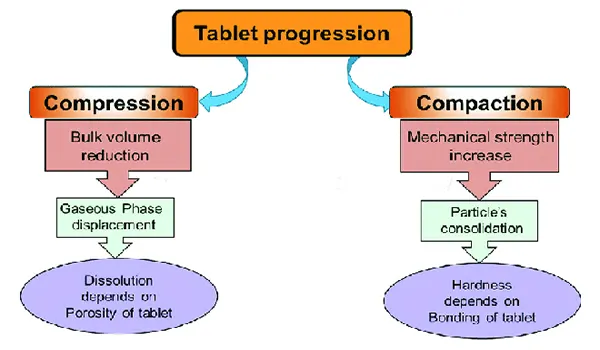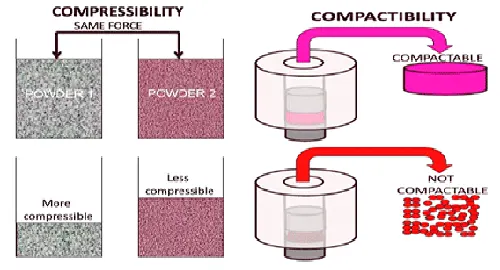Compression and Compaction are related to tablet manufacturing. The most widely used dosage form is Tablets and two-thirds of all used pharmaceutical dosage forms consist of tablets [1].
Table of Contents
The literal meaning of compression and compaction
Compression is a process of compressing, or increasing in density, or lessening the bulk volume of granules or powder. While Compaction is the process of alteration of powders into a coherent specimen or compacting powder or granules.
Definition of compression and compaction
Compression is the lessening of the bulk volume of powder by means of displacement of the gaseous phase under compressional force. According to USP (United States Pharmacopoeia) Compression is the reduction in the volume of a powder bed due to the application of stress, e.g., loading [2]. Also, USP defines compressibility as the ability of a powder to be compressed (reduced in volume) by the application of stress.

On the other hand, Compaction is the compression & consolidation of two phases (solid and gas) system due to applied force [3]. According to USP (United States Pharmacopoeia) Compaction is the transformation of powder into an intact compact with measurable strength and defined shape by the application of compression pressure [2]. Compaction of powders is a general term used to describe a situation in which powdered material is subjected to some level of mechanical force [3]. Also, USP defines Compactibility as the ability of a powder to form an intact compact with measurable strength.
Occurrence
The reduction of the bulk volume of powder or granules occurs in compression. While in compaction, an increase in mechanical strength occurs.
Basic mechanism
Compression is the process of the gaseous phase displacement from granules or powders. Whereas, compaction is the process of consolidation of particles.

Do you know the relation between compression and compaction?
The compression of granules is a part of the compaction process. While compaction has two phases compression and consolidation.
Hence, Compaction = compression + consolidation.
Association
The term compression is associated with the compression force-porosity profile. While Compaction is associated with the tensile strength of the tablet and its porosity.
Machine for tablet compression and compaction
Simply, Compression is done by tablet compression machines such as
- Single punch machine
- Multi punch machine
- Rotary tablet compression machine
- High-speed Rotary tablet compression machine
- Multi-layer Rotary tablet compression machine
On the other hand, Compaction is done by compactor machines such as
- Roller Compactor
- Hydraulic Compactor
Summary of the difference between compression and compaction of tablets
| Compression | Compaction |
| Compression is a process of compressing, or increasing in density, or lessening the bulk volume of granules or powder. | Compaction is the process of alteration of powders into a coherent specimen or compacting powder or granules. |
| Compression is the lessening of the bulk volume of powder by means of displacement of the gaseous phase under compressional force. | Compaction is the transformation of powder into an intact compact with measurable strength and defined shape by the application of compression pressure. |
| The reduction of the bulk volume of powder or granules occurs. | An increase in mechanical strength occurs. |
| Consolidation is not necessary for compression. | Consolidation must require for compaction. |
| Compression is the process of the gaseous phase displacement from granules or powders. | It is the process of consolidation of particles. |
| Compression is a part of the compaction process. | It has two phases compression and consolidation. |
| A tablet compression machine required such as – Single punch machine – Multi-punch machine – Rotary tablet compression machine – High-speed Rotary tablet compression machine – Multi-layer Rotary tablet compression machine | It is done by compactor machines such as – Roller CompactorHydraulic Compactor |
Also, you may read:
- Difference between Lubricant and Glidant
- Tablet Coating Defects and Remedies
- Blister packaging vs Strip Packaging
- Difference between Packing and Packaging
References
- Wu, C. and Seville, J.P.K. (2009) ‘A comparative study of compaction properties of binary and bilayer tablets’, Powder Technology, 189(2), pp. 285-294.
- (2020). The United States pharmacopeia. The National formulary. Rockville, Md. : United States Pharmacopeial Convention, Inc.,
- Lachman, L., & Liebermann, H. A. (2013). The Theory and practice of industrial pharmacy. Washington Square, Philadelphia USA: Lea & Febiger